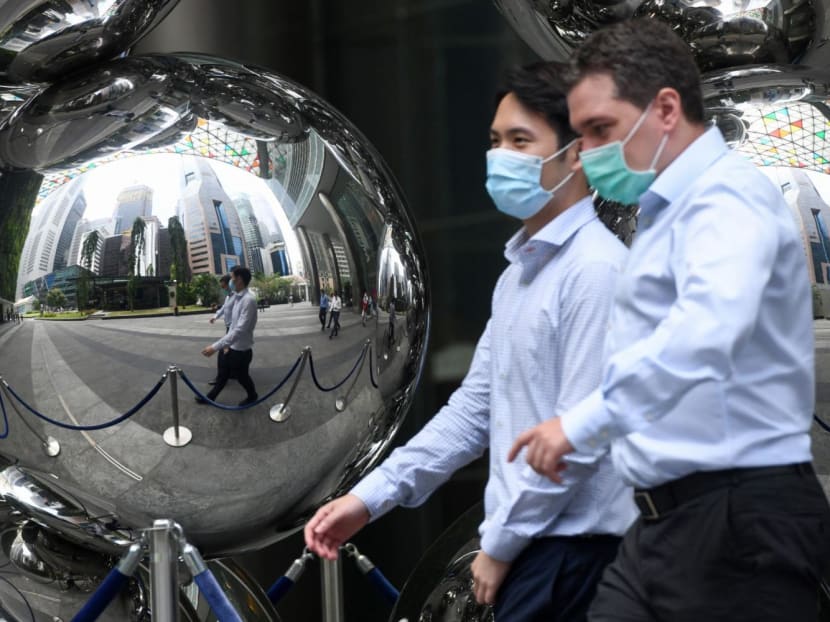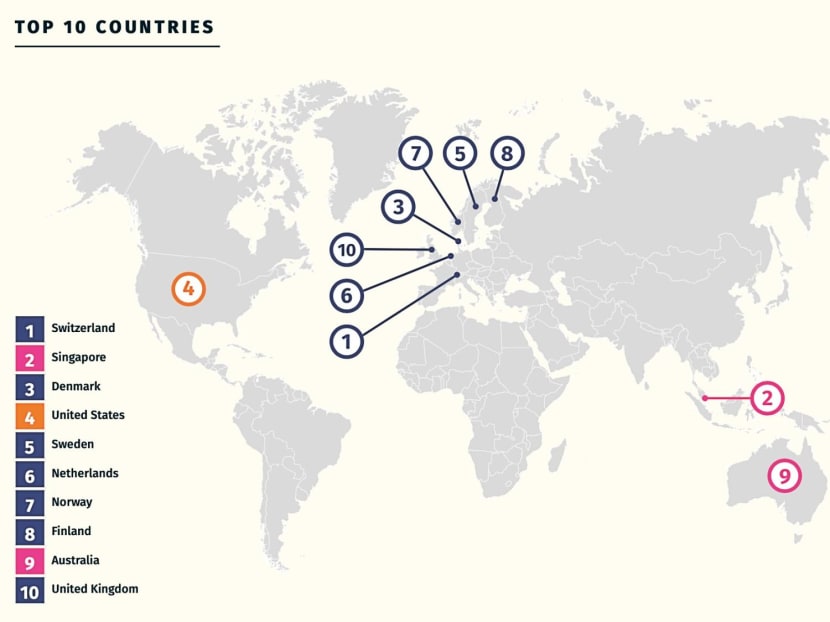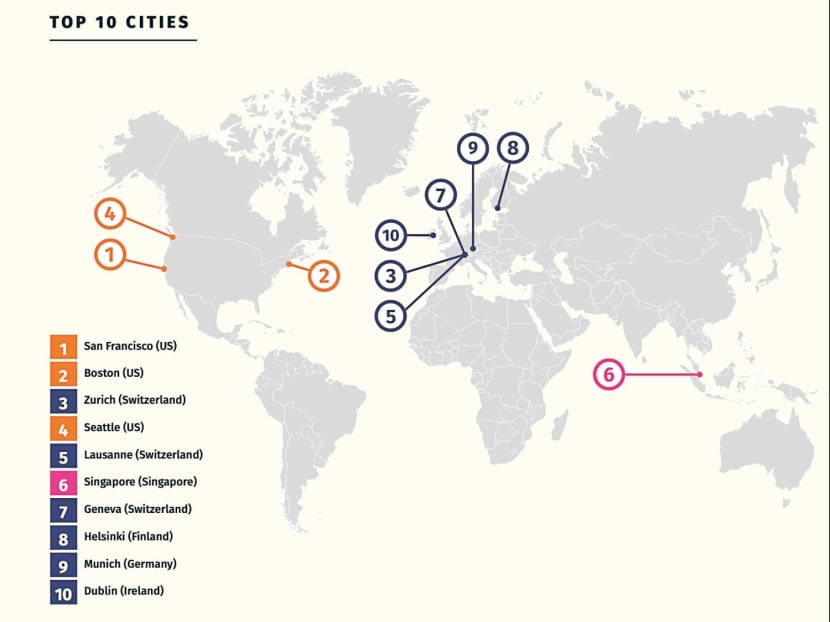- Joined
- Apr 14, 2011
- Messages
- 17,843
- Points
- 113
Singapore ranks 2nd after Switzerland at attracting talents but has trouble retaining them: Insead

People walking past an art installation in the financial business district of Singapore.
Follow us on Instagram and Tiktok, and join our Telegram channel for the latest updates.
- Singapore rose one spot to rank sixth as a city in attracting and fostering talent
- In the ranking by countries, it retained its second-place position behind Switzerland
- Singapore did not score well in its ability to retain talent
- Researchers for the talent competitiveness index predicted that Covid-19 and geopolitical tensions will have significant impact on labour markets around the world
LOU SI YUAN
Published November 3, 2022Updated November 4, 2022
WhatsAppTelegramFacebookTwitterEmailLinkedIn
SINGAPORE – Singapore moved up one spot this year to rank sixth among cities in attracting and developing talent, while retaining its second position behind Switzerland in the ranking among countries.
The latest Global Talent Competitiveness Index report, released on Thursday (Nov 3), showed that Singapore was the only country in Asia to feature among the top 20 for both cities and countries in the rankings, which were dominated by European countries.
ADVERTISEMENT
Denmark overtook the United States to place third in the country ranking.
The report also showed, though, that Singapore did not do so well in retaining talent.
In the ranking by cities, the top five before Singapore were leader San Francisco in the US, followed by Boston in the US, Zurich in Switzerland, Seattle in the US and Lausanne in Switzerland.
WHAT IS THE GLOBAL TALENT COMPETITIVENESS INDEX?
READ ALSO
Singapore tops global index on value added by 'elites' to society for second straight year
The index is published yearly by graduate business school Insead.
It is a comprehensive benchmarking report that measures how countries and cities grow, attract and retain talent.
ADVERTISEMENT
The findings are meant to allow decision-makers to develop strategies to boost competitiveness.
The 2022 report covered 133 countries and 175 cities from around the world across all groups of income and levels of development.
There were two broad rankings of note:
- the Global Talent Competitiveness Index ranks nations
- the Global City Talent Competitiveness Index ranks cities
HOW DID SINGAPORE FARE?
READ ALSO
The Big Read: Amid intensifying global talent war, Singapore faces juggling act in hunt for world's best and brightest
Singapore has been the second-most talent-competitive country in the world and has held its position since the index was first put out in 2013 — except in 2020 when it fell to third place.
ADVERTISEMENT

There were six “pillars” that made up the rankings and in the 2022 report, Singapore scored among the top five for most:
- Ability to enable talents (Singapore was fifth)
- Ability to attract talents (second)
- Ability to grow talents (second)
- Ability to retain talents (36th)
- Vocational and technical skills (third)
- Global knowledge skills (first)
There were 17 variables considered for the city index scoring system, compared to 69 variables in the country index.
Singapore fell behind the top five cities in Switzerland and the US due to its comparatively lower scores, for example, in:
- the presence of Forbes global 2000 companies (the ability to attract talents)
- its tertiary enrolment for education (the ability to grow talents)
- its software development and airport connectivity (global knowledge skills)

WHAT ARE SINGAPORE'S TOP STRENGTHS?
Under the country index, however, Singapore was a leader in global knowledge skills, where it ranked at the top in two sub-pillars: High-level skills and talent impact.ADVERTISEMENT
READ ALSO
New 5-year work pass for top earners, shorter time to hire foreigners among moves to draw talent: MOM
High-level skills took into account:
- Workforce with tertiary education
- Population with tertiary education
- Professionals
- Researchers
- Senior officials and managers
- Digital skills
- Innovation output
- High-value exports
- Software development
- New business density
- Scientific journal articles
"Singapore also impresses with its enabling environment, where it is the world’s best performer when it comes to regulatory landscape."
WHAT IS SINGAPORE'S WEAKNESS?
The country index looked at two key components when comparing talent retention: Sustainability and lifestyle.Retaining talent remained a weakness for Singapore. Some variables that pulled down its ranking in this area were:
- Pension coverage, social protection and environmental protection under the sustainability component
- Personal rights and physician density under the lifestyle component. Physician density refers to the number of medical doctors, including generalist and specialist medical practitioners, for every 10,000 people
“
New working habits — such as ‘quiet quitting’ and younger generations’ increased attraction towards gigs and part-time jobs — are calling for new ways to grow, attract and retain talent.
One of the key messages of the Global Talent Competitiveness Index 2022
”
WHAT LIES AHEAD
READ ALSO
TODAY Youth Survey: 2 in 5 plan to switch jobs in next 6 months; remote working a must-have for many
As the world enters times of higher economic, social and political uncertainty, talent hubs will be better equipped to weather the storm, Insead said.
"Cities that appear well-positioned to be future-ready include medium-sized cities (between 200,000 and two million population), as well as those that will prove agile enough to align and mobilise their resources along key lines such as digital transformation, offering attractive work environments to younger generations, and contributing to reaching sustainable development goals."
These sustainable development goals, defined by the United Nations, include reduced inequality, quality education, gender equality, climate action, and responsible consumption and production.
Even in higher-income economies, labour markets may become more fragmented, thereby generating new types of inequalities, Insead said.
These may not be helped by ongoing international tensions, disrupted supply chains and a return of protectionist policies.
“New working habits and attitudes towards employment — such as ‘quiet quitting’ and younger generations’ increased attraction towards gigs and part-time jobs — are also shattering long-established implicit rules and calling for new ways to grow, attract and retain talents at the enterprise level.”
READ ALSO
Agencies to identify exceptional achievers for new One Pass as part of S'pore's global talent 'offensive': Tan See Leng
Professor Felipe Monteiro from Insead, a co-author of the report, said that with the ongoing economic and geopolitical crises having a significant impact on the labour market, this will likely elevate the level of inequalities on the global talent situation between richer and poorer economies in the coming years.
Insead partnered with the Portulans Institute — an independent non-profit research and educational institute based in the US — and the Human Capital Leadership Institute (HCLI) in producing the report.
HCLI is a subsidiary of Temasek Management Services, which is wholly owned by Singapore’s state investment firm Temasek Holdings, and is supported by the Singapore Ministry of Manpower and the Singapore Economic Development Board.
In the report, HCLI said that for Singapore, developing local talent and attracting global talent have been key drivers of its economy.
Mrs Doris Sohmen-Pao, its chief executive officer, said: “Aligned with this goal… Singapore’s key investments centred on human capital development have helped ensure the smooth calibration of our talent pool and helped tide us over the (Covid-19) pandemic and volatility of the markets.”
She added: “Accelerated by the current waves of events, these shifts will continue to be shaped and sharpened, which warrants our continued attention on establishing and concretising Singapore’s position as a global talent hub.”



